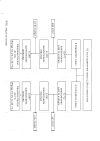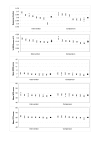PRISM (Program of Resources, Information and Support for Mothers): a community-randomised trial to reduce depression and improve women's physical health six months after birth [ISRCTN03464021]
- PMID: 16483383
- PMCID: PMC1479326
- DOI: 10.1186/1471-2458-6-37
PRISM (Program of Resources, Information and Support for Mothers): a community-randomised trial to reduce depression and improve women's physical health six months after birth [ISRCTN03464021]
Abstract
Background: In the year after birth one in six women has a depressive illness, 94% experience at least one major health problem (e.g. back pain, perineal pain, mastitis, urinary or faecal incontinence), 26% experience sexual problems and almost 20% have relationship problems with partners. Women with depression report less practical and emotional support from partners, less social support, more negative life events, and poorer physical health and see factors contributing to depression as lack of support, isolation, exhaustion and physical health problems. Fewer than one in three seek help in primary care despite frequent health care contacts.
Methods: Primary care and community-based strategies embedded in existing services were implemented in a cluster-randomised trial involving 16 rural and metropolitan communities, pair-matched, within the State of Victoria, Australia. Intervention areas were also provided with a community development officer for two years. The primary aim was to reduce the relative risk of depression by 20% in mothers six months after birth and to improve their physical health. Primary outcomes were obtained by postal questionnaires. The analysis was by intention-to-treat, unmatched, adjusting for the correlated nature of the data.
Results: 6,248 of 10,144 women (61.6%) in the intervention arm and 5057/ 8,411 (60.1%) in the comparison arm responded at six months, and there was no imbalance in major covariates between the two arms. Women's mental health scores were not significantly different in the intervention arm and the comparison arm (MCS mean score 45.98 and 46.30, mean EPDS score 6.91 and 6.82, EPDS > or = 13 ('probable depression') 15.7% vs. 14.9%, Odds ratio(adj) 1.06 (95% CI 0.91-1.24). Women's physical health scores were not significantly different in intervention and comparison arms (PCS mean scores 52.86 and 52.88).
Conclusion: The combined community and primary care interventions were not effective in reducing depression, or in improving the physical health of mothers six months after birth.
References
-
- Astbury J, Brown S, Lumley J, Small R. Birth events, birth experiences and social differences in postnatal depression. Aust J Public Health. 1994;18:176–84. - PubMed
-
- Brown S, Lumley J. Maternal health after childbirth: results of an Australian population-based survey. Br J Obstet Gynaecol. 1998;105:156–61. - PubMed
-
- Small R, Brown S, Lumley J, Astbury J. Missing voices: what women say and do about depression after childbirth. J Reprod Inf Psychol. 1994;12:89–103.
-
- Brown S, Lumley J. Physical health problems after childbirth and maternal depression at six to seven months postpartum. Br J Obstet Gynaecol. 2000;107:1194–1201. - PubMed
Publication types
MeSH terms
Associated data
LinkOut - more resources
Full Text Sources
Medical



